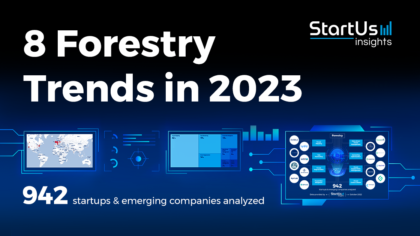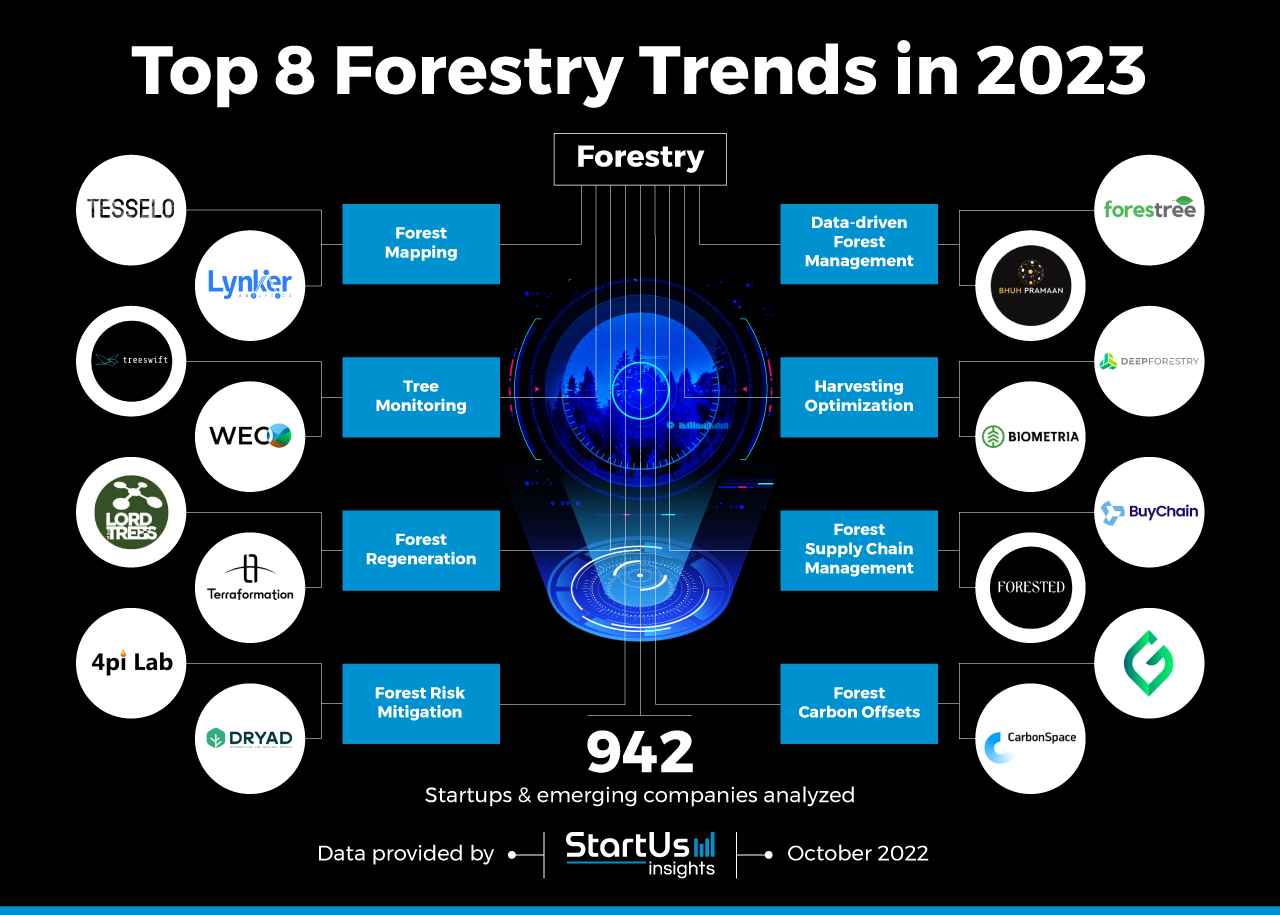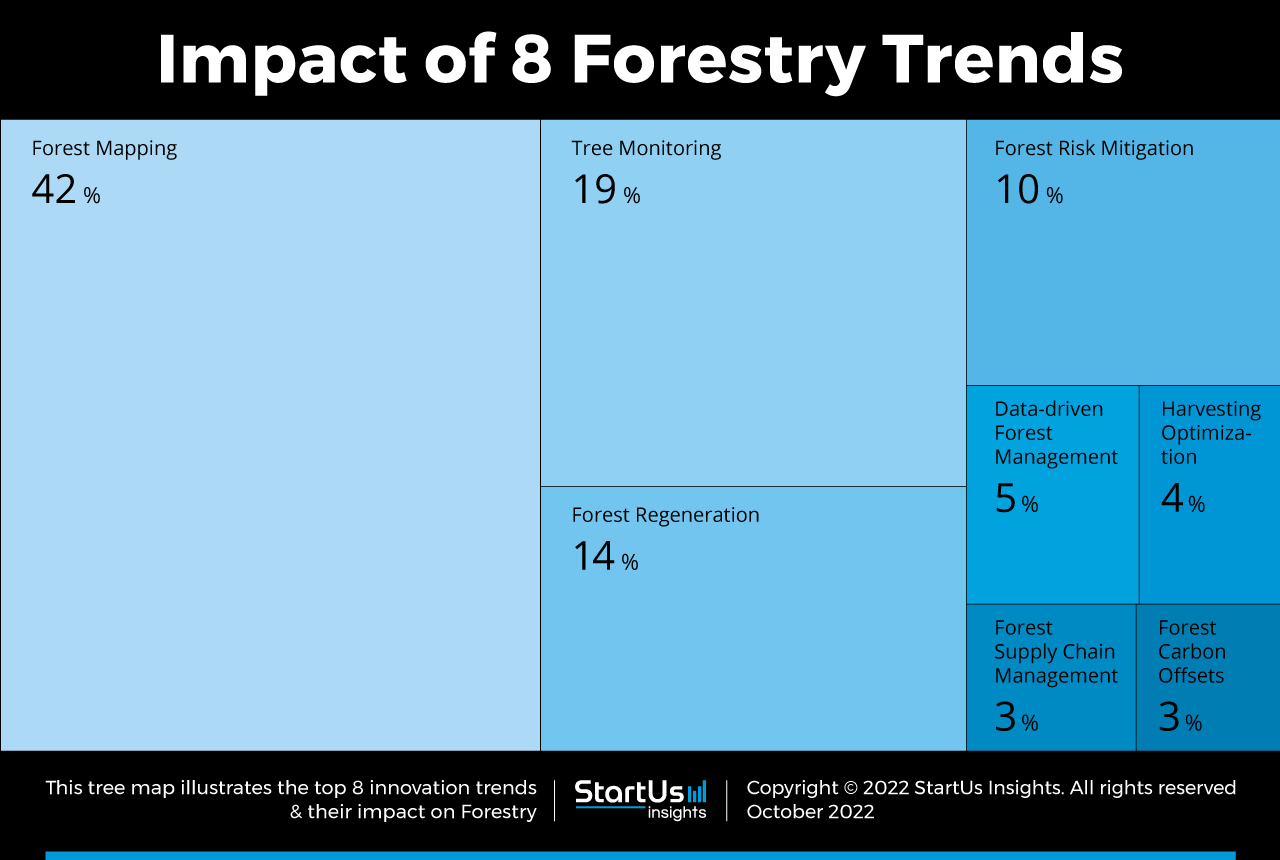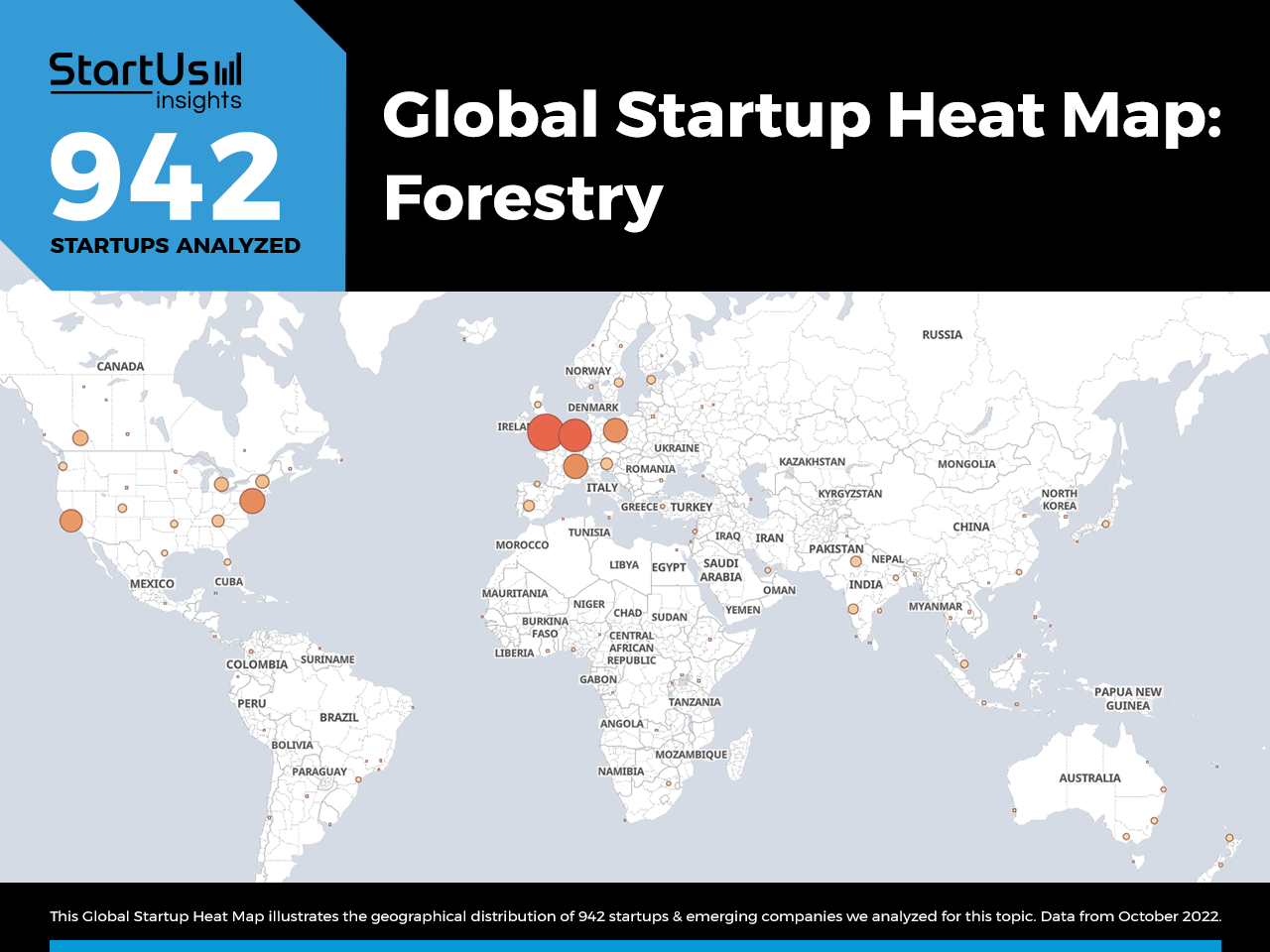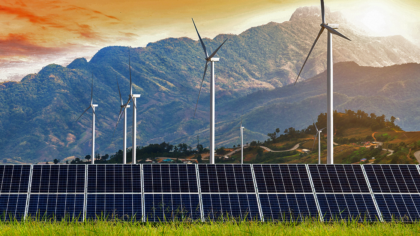The forestry industry continues to be an important source of a variety of raw materials. However, concerns about deforestation and land degradation are necessitating a rethink of how the industry operates. Emerging forestry trends leverage technologies like artificial intelligence (AI) and the Internet of Things to make the industry more efficient and sustainable. In this report, learn which forestry trends will impact the industry in 2023 and beyond.
Innovation Map outlines the Top 8 Forestry Trends & 16 Promising Startups
For this in-depth research on the Top Forestry Trends & Startups, we analyzed a sample of 942 global startups and scaleups. The result of this research is data-driven innovation intelligence that improves strategic decision-making by giving you an overview of emerging technologies & startups in the forestry industry. These insights are derived by working with our Big Data & Artificial Intelligence-powered StartUs Insights Discovery Platform, covering 2 500 000+ startups & scaleups globally. As the world’s largest resource for data on emerging companies, the SaaS platform enables you to identify relevant startups, emerging technologies & future industry trends quickly & exhaustively.
In the Innovation Map below, you get an overview of the Top 8 Forestry Trends & Innovations that impact forestry companies worldwide. Moreover, the Forestry Innovation Map reveals 16 hand-picked startups, all working on emerging technologies that advance their field.
Top 8 Forestry Trends
- Forest Mapping
- Tree Monitoring
- Forest Regeneration
- Forest Risk Mitigation
- Data-driven Forest Management
- Harvesting Optimization
- Forest Supply Chain Management
- Forest Carbon Offsets
Tree Map reveals the Impact of the Top 8 Forestry Trends
Based on the Forestry Innovation Map, the Tree Map below illustrates the impact of the Top 8 Forestry Trends. Forest mapping and tree monitoring solutions provide granular insights into the health of forest ecosystems. Regeneration and risk mitigation solutions use technologies like sensors and AI to protect and restore forests. Tech-based solutions generate data-driven insights that are enabling the optimization of harvesting and forest management. Supply chain improvements and carbon offsets are important trends that contribute to the profitability and sustainability of forestry companies.
Global Startup Heat Map covers 942 Forestry Startups & Scaleups
The Global Startup Heat Map below highlights the global distribution of the 942 exemplary startups & scaleups that we analyzed for this research. Created through the StartUs Insights Discovery Platform, the Heat Map reveals that Europe and the US see the most startup activity.
Below, you get to meet 16 out of these 942 promising startups and scaleups as well as the solutions they develop. These forestry startups are hand-picked based on criteria such as founding year, location, funding raised, and more. Depending on your specific needs, your top picks might look entirely different.
Top 8 Forestry Trends in 2023
1. Forest Mapping
Forest mapping is the major technology trend in the forestry industry. It provides data-driven insights on tree cover, woodland resources, and landscape developments. Forest mapping enables forest conservation and forest resource analysis as well as accelerates climate tech solutions. Startups use smart sensors to monitor weather conditions such as rainfall, temperature, and humidity. By integrating these factors into forest health, mapping solutions serve a range of scientific, policy, and reporting applications.
Tesselo develops Real-Time Forest Mapping
British startup Tesselo offers real-time forest mapping solutions. Its solutions classify tree species, measure and predict forest growth, monitor plantation harvests, detect pests, and estimate the risk or impact of forest fires and other natural disasters. These solutions enable businesses to develop adequate responses to natural hazards and timely estimate damages after a disaster. Tesselo’s solutions also improve compliance with local environmental regulations.
Lynker identifies Deforestation and Replantation
New Zealand-based startup Lynker Analytics uses multi-scale convolutional neural network (CNN) models to classify each target into land cover units with a spatial resolution of 100 square meters. The startup’s automated monitoring system (AMS) allows the detection of deforestation, re-planting, and other land cover changes exceeding one hectare. It also enables a more rapid assessment of replant status used by the Ministry for reporting.
2. Tree Monitoring
There are strong relationships between tree cover and ecosystem health. Tree monitoring systems allow authorities to keep track and count of the trees in the forest. Foresters attach sensors to selected trees within the forest to measure various eco-physiological and biological parameters that indicate the health of tree foliage. This allows foresters and civic insights to make data-driven decisions about conserving and expanding tree cover in both inhabited and forested areas.
Treeswift develops Forest Monitoring Systems
US-based startup Treeswift builds forest monitoring systems that provide forest stakeholders with precision data and analyses that are easily accessible and flexible. The startup collects data from drones. It uses machine learning technology to extract individual tree metrics and provide tree analytics. The startup’s product performs carbon capture estimation, timber value estimation, deforestation monitoring, advanced growth forecasting, and forest management.
WEO enables Canopy Mapping
Urban forests are increasingly vital to maintaining the resilience of cities. Luxembourg-based startup WEO uses satellite technology and AI for canopy mapping in cities. It enables cities to track the green cover by replacing manual surveys with a more efficient alternative. Further, the startup’s technology monitors defoliation and discoloration to identify trees that need attention.
3. Forest Regeneration
Advanced forest regeneration solutions advance forest renewal by natural or artificial means. Forest regeneration is essential for scientific forestry as well as ensuring sustainable forest yields. Startups are advancing a range of natural techniques to restore degraded forests while also increasing wood harvests. Tech-enabled solutions such as data analytics and artificial intelligence supplement these techniques to increase seedling dispersal, optimize nutrient allocation, and predict yield.
Lord of The Trees advances Precision Planting
Australian startup Lord of The Trees builds precision planting solutions. The startup develops forestry tools that include a unique drone technology capable of precision planting over hundred thousand seeds in half a day. It packs seeds into a carefully balanced fertilizer mix. These seed pods sustain optimum germination conditions, increasing the seeds’ chances of developing a healthy root system. This way, the startup enables ecosystem restoration on a large scale.
Terraformation develops Forest Regeneration Software
US-based startup Terraformation builds forest regenerative software that supports the entire reforestation process. It enables partners around the world to remotely monitor all aspects of restoration from the seed bank to the nursery and the planting site. Further, the software allows farmers to remotely monitor conditions in the seed bank, manage inventory, and integrate with botanical databases for more robust data.
4. Forest Risk Mitigation
Forest risk management solutions tackle the risk of fires and damages due to climate change and natural disasters. This also includes artificial human attempts like deforestation, illegal logging, and other activities disturbing the forest ecosystem. Henceforth, emerging technologies including artificial intelligence and machine learning predict natural forest risks like forest fires, log falls, and natural hazards. Forest risk mitigation solutions also deter illegal actions like logging, smuggling, and poaching.
4pi Lab offers Space-based Wildfire Detection
Canadian startup 4pi Lab detects early wildfires. The startup uses satellites to detect wildfires from space. The startup provides the constellation of sixteen satellites orbiting around the earth to send real-time updates related to fire. It has high-performance cameras that identify wildfires that are as small as 5 to 10 meters in diameter in addition to the precision geo-location targeting for location accuracy. This allows forest authorities to prevent initial wildfires from becoming potentially catastrophic wildfires. This further enables us to reduce carbon emissions and protect trees.
Dryad Networks advances IoT-enabled Wildfire Detection
German startup Dryad Networks uses a network of sensors for early forest fire detection. Its sensor monitors parameters like microclimate, temperature, humidity, and air pressure. This allows it to detect fires as early as during the smoldering phase. Featuring low-range wide-area network (LoRaWAN), Dryad Network’s sensor network provides extensive coverage over large forested areas.
5. Data-driven Forest Management
With technologies such as satellite sensing and sensors, there is a large amount of data now available on forests. These are enabling foresters to take data-driven decisions to support all aspects of forest management. Startups are building data-driven forest management tools to estimate forest value, predict yield as well as assess the impact of sustainability initiatives. This improves logistical planning to improve profitability as well as maximizes the impact of carbon offsetting initiatives.
Forestree makes Forest Management Software
Australian startup Forestree makes all-in-one tree management software. The startup’s solution provides data about individual trees. This includes information like height, location, image, age, canopy, width, and planted date of the tree. It also enables users to analyze and report the tree data. This enables the local authorities to perform tree inspections, conserve species, and assess risks to forests.
Bhuh Pramaan enables Natural Resource Management
Indian startup Bhuh Praman develops solutions for natural resource management. The startup combines remote sensing, IoT, and AI to provide insights from geospatial insights. This allows foresters to take data-driven insights to manage and conserve forests. For example, it enables scientific forest planning and resource management to increase returns while improving the resilience of forests to climate change.
6. Harvesting Optimization
Deforestation is a major threat that is exacerbating the perils of climate change. However, many industries still depend on forest products. This is why there is a growing need to harvest forests without permanently degrading them. Harvesting optimization ensures that the correct number of trees are cut down, while also maximizing the number of usable goods recovered. Startups and scaleups advance harvesting optimization with tech-enabled solutions that improve the efficiency and sustainability of harvesting.
Deep Forestry enables Precision Forestry Planning
Swedish startup Deep Forestry uses machine learning and robotics to assess and predict the growth of trees in forests. The startup’s drone scans every tree in a forest and enables precision planning for foresters. This makes the forestry industry more efficient by providing data-driven insights about where and how to harvest timber. It also contributes to sustainability by reducing the impact of logging on the environment.
Biometria supports Timber Planning
Swedish startup Biometria develops solutions for timber logistics, production, and trading. It digitizes the reporting and measurement of timber, improving transparency. With accurate production reporting, it simplifies the planning of timber volumes and quality. It also facilitates remote measurements of timber and other forest products. This way, the startup’s solutions facilitate customers to maximize the value of forest products.
7. Forest Supply Chain Management
The forest supply chain comprises different stages including production facilities, inventory control, transportation, and logistics for forest products. Blockchain improves supply chain transparency by decentralizing the value chain of forestry products. With traceability software and QR-enabled smart packaging, companies track the movement of goods from forests to manufacturing facilities. Further, AI and robotics enable warehouse automation, improving the shelf life of forestry products. This way, technology advancements are enabling safer and more automated forest supply chains.
Forested creates Sustainable Supply Chains
Ethiopian startup Forested creates end-to-end supply chains of premium forest products. It provides consumer brands with climate-neutral and nature-positive ingredients, including beeswax, honey, and coffee. It collects these ingredients from smallholder farmers living in or around forests. This way, the startup’s sustainable agroforestry model combines social impact with forest conservation.
BuyChain optimizes Lumber Supply Chain
US-based startup BuyChain creates supply chain solutions for lumber distributors. The startup’s platform brings all aspects of lumber businesses together in a centralized interface. It manages volatility and reduces risk by allowing suppliers, distributors, and retailers to plan well in advance. This increases the profits for all players dealing with lumber.
8. Forest Carbon Offsets
Forest carbon offsets enable landowners to monetize the carbon stored by trees and soils and further allow them to sell it on the carbon market. Over the past decade, forest carbon offsets have emerged as one of the fastest-growing finance tools to incentivize forest conservation. Carbon offsets fund projects that reduce greenhouse gas emissions, such as planting trees or renewable energy investments. The forestry industry also purchases carbon offsets to offset the emissions from their own operations.
GainForest incentivizes Sustainable Nature Stewardship
Swiss startup GainForest offers an AI-enabled platform for sustainable nature stewardship. The startup uses machine learning to verify environmental impact and provide communities with the opportunity to receive instant payments. It enables users to invest in decentralized green funds. The payments are autonomously channeled to local communities and certified on a distributed ledger.
CarbonSpace monitors Forestry Carbon Footprint
Irish startup CarbonSpace monitors carbon footprint using AI technology. The startup’s platform leverages satellite, ground sensors, and inventory data. It provides actionable insights about farm, field, and forest emissions. This facilitates climate-responsible decisions and maximizes the potential of carbon offsets. This way, the startup enables forestry companies to measure the footprint of their operations and supply chains and design carbon offsets to compensate for it.
Discover all Forestry Trends, Technologies & Startups
With greater adoption of technology trends, the forestry industry continues to transition towards precision forestry. Technologies such as global positioning systems (GPS), drones, and precision cutting techniques strike a balance between forest productivity and sustainability. Regenerative forestry and forestation are revitalizing the forests and increasing the global forest cover.
The Forestry Trends & Startups outlined in this report only scratch the surface of trends that we identified during our data-driven innovation and startup scouting process. Among others, precision forestry, satellite mapping, and regenerative agroforestry will transform the sector as we know it today. Identifying new opportunities and emerging technologies to implement into your business goes a long way in gaining a competitive advantage. Get in touch to easily and exhaustively scout startups, technologies & trends that matter to you!
